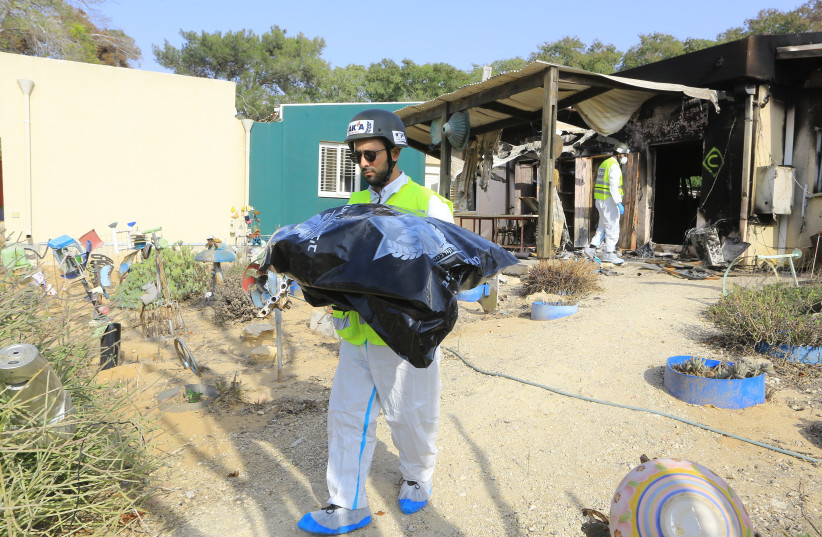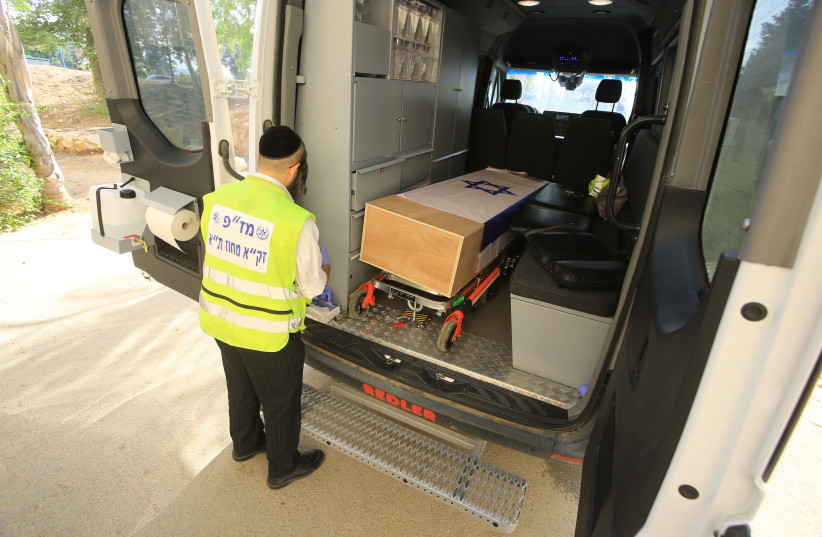“I was in Kibbutz Nir Oz. I entered a house – a typical house. Breakfast was on the table. Personal documents, passports. People had lives. And in just a couple of seconds, it all ended.”
So explains Barouch Niddam, the director of ZAKA Tel Aviv, who was among the hundreds of ZAKA first responders that entered southern Israel following the Hamas massacre on October 7 to collect the dead bodies and ensure their proper burial.

The event took place on Simchat Torah, the Jewish holiday on which the people of Israel celebrate the completion of the Torah and the start of a new Torah reading cycle. Although Niddam is an ultra-Orthodox Jew, because of his role with ZAKA, he maintains communication at all times. That day, his team was contacted to offer support down south.
Niddam said he rushed to the kibbutzim. “Very fast, we understood that we were in an event of a different scale. This was something we had never encountered.
“We worked under fire,” Niddam recalled. “Under actual fire, alongside the army.”
ZAKA Tel Aviv has been operating for over 20 years in over 21 cities across Israel with a team of thousands of volunteers. The organization is recognized as a civil extension of Israel’s emergency services and the only emergency response unit authorized to operate in central Israel.
Even before October 7, ZAKA volunteers worked day and night in response to acts of terror, natural disasters, and tragedies big and small to ensure the safety of all Israelis. Its primary efforts center on bringing the bodies of the dead to burial; in situations like what Israel saw in the Hamas massacre, this job can be nearly impossible.
“Horrible sights. Slaughtered people stabbed people. Burnt. People are cut in half. Babies. And I am talking about dozens and dozens,” described ZAKA Tel Aviv Spokesperson Israel Hasid. Only 24 years old, the son of a ZAKA volunteer, he said what he saw in southern Israel was almost indescribable. Although he is a spokesperson, he said that when tragedy strikes, “your role does not matter,” he was sent, like everyone else, to help with the cleanup efforts.
“We entered a house and saw an entire family had been shot. There were pools of blood,” Hasid said. “We felt like we were in hell. The smell of the blood is a smell that I will never forget. The sight of the blood sprayed on the wall. We saw a person who tried to fight back and protect his wife and children. This is something I will never forget. Never.
“Never will these sights be erased from my mind.”
For every one person, there were more than 1,000 others. The country has said it believes there are around 1,200 people who were murdered in the attack, although Israel’s forensics hospitals are still working to identify some people’s remains. In addition, more than 4,000 people were injured, leaving behind limbs in the field that needed to be rescued and buried. In addition, because Hamas terrorists torched people to death in their homes, there are bone fragments and ligaments that need to be pulled from the ashes so they can be identified and closure can happen.
“ZAKA’s war is to bring every Jew to a Jewish cemetery,” Niddam said. “We do not give up on anyone.”
A personal mission
The team takes it personally.
“I dealt with a girl that all left of her was a leg and a shoe,” Niddam said. “After I deal with this kind of thing, I have to go back to my home in the evening and see my daughter’s tennis shoes by the door. I must help her tie them up before she leaves for school the following day.
“You see the remains of a father who was hugging his son. They were tied together with wire,” Niddam continued. “What you think about is the expectation of that son when he ran to his father. What did he expect from him? He wanted his father to save him. But the father cannot keep him. He cannot save him because he is also a victim.
“These are the sights that you live with every day, every hour – for your entire life,” he said. “It does not leave you. It cannot leave you.”

Niddam said that when the team is on the job, they try to dissociate themselves, and most of the time, they are better able to. But this time, the situation has been different. Volunteers cannot eat. They cannot sleep. They just want to make sure that every victim is rescued. That every victim is identified. That every victim is buried.
Ultimately ZAKA is fortified for the next tragedy – and there will be another tragedy.
“You help people who cannot reciprocate. The dead cannot reciprocate,” Niddam said.
“I want a stronger ZAKA,” he continued. “ZAKA Tel Aviv is the power of grace. We need a stronger ZAKA.”
To support ZAKA and its mission to give eternal rest to every victim of terror, click here.
This article was written in cooperation with ZAKA Tel Aviv.
